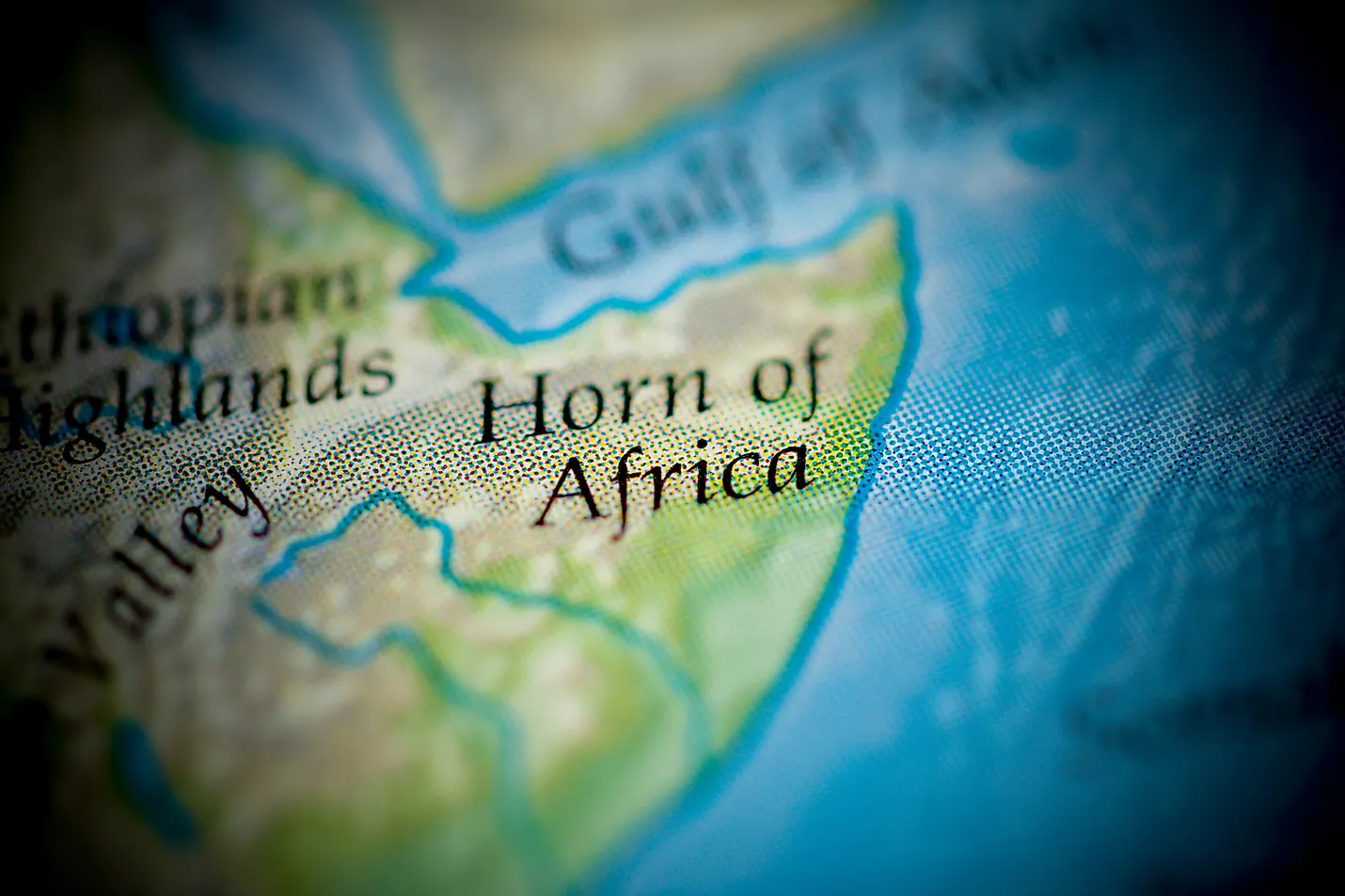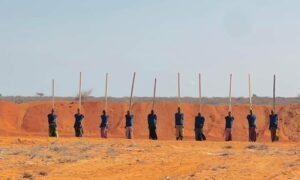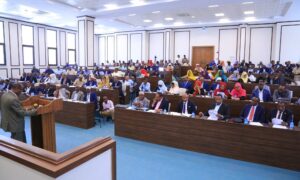01.04.2022: Mogadishu, Somalia
Earlier this month, officials from the self-declared Somaliland travelled to Washington in a bid to seek US support for its independence from the Somali Republic.
This is not the first time that officials in Hargeisa have travelled to a Western capital to seek support. However, it seems as though on this occasion, there is more spotlight on the growing calls for recognition of Somaliland. A move that has upset a lot of Somali people that support a unified Somalia including some residing in the territories of the self-declared Somaliland.
To understand this growing spotlight, we must zoom out of Somalia and actually look at the geopolitics of the region.
Tensions between China and US have been growing in recent months within the Horn of Africa region as a wind of political changes sweeps.
Conflict in Ethiopia saw the old Ethiopia clash with a new. TPLF, the former masters of Ethiopia entered a gruelling war with the newly re-elected Ethiopian coalition led by PM Abiy Ahmed. The conflict saw the world divide into East and West as the US and her allies gave support to the TPLF whereas Chinese FM Wang Yi visited Addis Ababa to showcase Beijing’s support for PM Ahmed.
Similarly, in Sudan we saw a coup that toppled former dictator Omar Al-Bashir and established a civilian government led by Abdalla Hamdok only to be overthrown by the Sudanese military led by Gen Abdel Fattah Al-Burhan in October 2021. Despite the fact that an agreement was reached due to mounting internal & international pressure, it has been rejected by many civil rights groups in Sudan.
Sudan remains at a crossroad as the nation grapples with its future.
In light of all these aforementioned political changes, we must keep these in mind when we analyse US policy towards Somalia, especially the Northern regions.
United States vs. China
As part of their pitch, Hargeisa officials reiterated offers to support a U.S. military footprint or base within the region in exchange for recognition of independence. The argument that China is posing a major threat to U.S. influence in the region has caught the eye of some U.S. lawmakers.
Indeed, the Chinese established a new Horn of Africa Special Envoy to directly challenge the U.S. special envoy. Ambassador Xue Bing has already made an official trip to Mogadishu where he met Somali officials while Hargeisa officials were meeting U.S. lawmakers in Washington D.C.
Taiwan and separatists in Hargeisa have already established diplomatic ties- a relation played up by some U.S. lawmakers- a trend that has angered both Somalia and China.
Nevertheless, despite all this drama occurring, the U.S. government has made its official position clear regarding the recognition of Somaliland.
In a statement, Molly Phee, the U.S. Assistant Secretary for the Bureau of African Affairs elucidated that:
- While the U.S. was delighted to host President Muse Bihi, discussions held between officials were within the framework of a ‘single Somalia’ policy.
A statement that reassured many worrying Somalis that the US was hinting at sympathy for the secessionist cause.
Somalis in favour of union in the US rallied against the delegation led by Muse Bihi. The United Somali Alliance (USA) is a group of Somali intellectuals and unionists that advocate for a U.S. foreign policy that has a unified Somalia at its heart.
With the support of the policy advisory and advocacy group Von Batten-Montague-York, the Somali movement successfully ensured that U.S. policy remained firmly that of a unified Somalia despite attempts by U.S. lawmakers to introduce a bill that would’ve seen partial recognition of Somaliland.
In a nationwide poll conducted by VBMY, 85% of participants that were of the voting age were against the U.S. changing current policy to recognise Somaliland, citing the dangerous of a civil war as the reason.
Nonetheless, in an interview with Voice of America Somali, Muse Bihi outlined that there was growing understanding from some lawmakers in the U.S. for the separatist cause in Hargeisa. He elucidated that the lack of direct western support stems from the lack of African support.
“It is an African issue”, he explained. “It is for African leaders and neighbours to take the initiative and recognise Somaliland”.
He further illuminated that despite this, his government has worked to push for financial funding to be sent directly to Hargeisa rather than through Mogadishu. An argument he said was supported by US lawmakers.
Growing discontent in the Northern regions
Many in the northern regions of Somalia have expressed discontent with the idea of the region becoming an independent state, separate from the rest of Somalia.
For many in the Awdal, Sool, Sanaag and Cayn (SSC) regions, a unified Somali republic is the end goal rather than a separate state.
As a result, there has been a dramatic increase in arbitrary arrests of individuals that expressed discontent with the regime in Hargeisa or show sympathy to a unified Somalia.
In a July 2019 report, Amnesty International highlighted the growing escalation of censorship, harassment and prosecution of government critics in the Somaliland region.
Between 17 April and 9 May, four individuals were arrested: a journalist, an opposition youth leader and a civil servant were detained after publishing critical Facebook posts, and a Member of Parliament was detained after he publicly questioned the significance of celebrating 18 May as a national day.
On 18 June, the authorities also arbitrarily suspended two privately-owned television stations – Horyaal 24 and Eryal TV – for allegedly “airing information that is threat to national security” without specific details. The ban on the two stations was lifted on 30 June after a “mutual understanding” was reached between the Ministry of Information and the TV owners. Many have interpreted this as arm-twisting the two media houses to censor their content.
On 17 April, freelance journalist, Abdimalik Muse Oldon, was arrested outside his home in Burao for criticizing President Muse Bihi Abdi on Facebook. He was charged on 6 June with “spreading anti-national propaganda” and “disseminating false news”.
In fact, Oldon is currently in detention and has been for months now for criticising a school in Hargeisa.
On 9 May, Mohamed Ahmed Dhakool, a Member of Parliament from Sool region, was arrested for “opposing” commemorating 18 May as a national day; (Somaliland declared its breakaway status from Somalia on 18 May 1991). The police claimed he made “anti-national statements” and “opposed the existence of Somaliland”, but the courts refused to entertain the case because of his parliamentary immunity. After 39 days in detention, he was released on 17 June
In fact just this month, Hargeisa officials arrested reporter Imran Adan because he interviewed ordinary citizens on Muse Bihi visit to the U.S.
The reality is that Hargeisa uses any means to control the narrative in the region and ensure the people of the region abide by these ideals and beliefs. Opposing views are simply not acceptable to Hargeisa, particularly ones that advocate unity with Somalia.
However, this has only increase tensions in the region as numerous battles have been fought in both SSC region and Awdal which saw civilians killed and arrested.
In the SSC for example, the ‘Khatumo State’ government has declared itself a Federal Member State of Somalia, awaiting recognition from Mogadishu. However, the region is also claimed by the Hargeisa regime as part of its own self-declared republic.
Similarly, in the Awdal region, the ‘Awdal State of Somalia’ was declared in favour of unity with the Somali republic.
Consequently, the recognition of the Hargeisa without the unified support of all inhabitants will inevitably lead to bloodshed and civil war in the region that could set Somalis back another 30 years.
International Pawns
The reality is that the question of Somaliland is only catching the eyes of some U.S. lawmakers not because of sympathy to supporters of this cause, but rather for self-interest to counter China.
The U.S. has seen Chinese influence in the Africa is a major threat to its hegemony on the continent alongside European allies such as Britain and France. China already has a major base in Djibouti and plans to expand bases in Africa with discussion already under way with numerous African countries including Kenya.
Similarly, China is interested countering U.S. influence in the region. For the Chinese, Africa is a new market to trade services and goods outside of Europe and the West.
In actuality, neither the U.S. or China actually care about the consequences to the Somali people if division is exacerbated in exchanged for military or economic gain. For instance, if Chinese were to hypothetically build a base in Southern Somalia, it is more likely for the U.S. to advocate for Somaliland to counter this influence.
The essence of the point is that Somali interests are not at the heart of these policies.
They simply care about their own interests, whatever cost. We’ve seen it Libya, Syria, Afghanistan and now we have a live case study in Ukraine. A nation caught in the middle of two colliding world powers as it decides its own future.
It was on the 1st of July, 1960 that the first independent regions of the Somali-lands were united to form the Somali Republic. 62 years later, the independence our forefathers strived ever so tirelessly for has been dismantled and is in disarray.
It is for Somalis to sit down and discuss the future of the Somali Republic.
The future of this republic is in the hands of Somalis. Opposing views must sit down and reach an agreement for the future of the people. It is only solution to achieve lasting peace for the Somali people.
For regular updates on Somalia follow Suldan Mohamed and Horufadhi Media on Social Media.







